A New Song Read online
Page 18
CHAPTER NINE
Home Far Away
“They got Dooley in jail.”
“ What?”
“But he’s all right, he ain’t hurt or nothin. . . .”
Cynthia sat up. “What is it, Timothy?”
He switched on the lamp. “Dooley.”
“Dear God!” she said.
“Tell me, Harley.” He once prayed he’d never live to hear what he was hearing now.
“Well, he was comin’ home on time, goin’ to be here right on th’ nickel....”
“And?” His mouth was dry, his stomach churning. Christ, have mercy. . . .
“An’ he picked up Buster Austin standin’ out on th’ road. You remember Buster.”
Indeed, he did. Buster had called yours truly a “nerd,” for which Dooley had mopped the floor of the school cafeteria with him. The last run-in was when Buster stole a pack of cigarettes and talked Dooley into smoking on school grounds. School principal Myra Hayes had nearly eaten one hapless priest alive for “allowing” such a thing to happen, and suspended Dooley for ten days.
“Buster said he needed a ride to git ’is clothes at somebody’s house, would Dooley take ’im, an’ Dooley said he would but make it snappy. Dooley set in th’ truck while Buster took in a empty duffel bag and come out a good bit later. Seems like th’ boys was goin’ down th’ road when two officers drove up behind ’em in a squad car. Pulled ’em over, hauled ’em off to th’ station for breakin,’ enterin,’ an’ larceny.”
“Larceny?” This was a bad dream.
“You know that empty duffel bag Buster carried in? Hit was full when Buster come out of th’ house. Had jewelry, a CD player, money, liquor, I don’t know what all in there.”
“No!”
“Police said th’ house had a silent alarm on it, an’ they was on th’ boys before they got out of th’ driveway good. But Dooley didn’t do nothin’.”
“I believe that.”
“Nossir, he didn’t, he was doin’ th’ drivin’ is all, but the police says ’til they know better, he’s locked up.”
“What can I do?” His legs were turned to water; he sank into the chair by the lamp.
“If I was you, Rev’rend, I’d do what preachers do.”
“Pray.”
“That’s right. I’m down at th’ station, an’ soon as I hear somethin’, I’ll call you. I know Dooley don’t want you worried an’ all. He would of called, but he’s upset about worryin’ you.”
“How is he, Harley? Tell me straight.”
“Well, he’s scared. He’s innocent, but hit’s scary bein’ th’owed in a cell like that an’ locked up.”
“Is Rodney there?”
“Last I heard, th’ chief was puttin’ on ’is britches an’ bustin’ over here.”
“Thank God for you, Harley.”
“Now, don’t you worry, Rev’rend.”
He hung up, trembling, feeling the immutable reality of six hundred miles between Mitford and his racing heart.
At one-thirty, he could bear it no longer and called the Mitford police station.
Rodney Underwood was questioning Dooley and Buster. No, they didn’t know when the chief would be through, but he would call when he was.
Jonathan trotted in and clambered onto their bed.
“I think I read somewhere that children aren’t supposed to sleep with their parents,” he said.
“We’re not his parents,” explained his wife.
Jonathan bounced down beside Cynthia, looking hopeful. “Watch a movie!”
Cynthia was not amused. “Jonathan, if you so much as utter the M word again, I will jump in the ocean!”
He nodded his head vigorously. “I can swim!”
“Good! Go to sleep.”
He poked his chubby finger into Cynthia’s arm. “You go to sleep, too.”
Father Tim paced the floor, checking his watch.
“I’m hungry,” said Jonathan.
“People don’t eat during the night.”
Jonathan held out both hands. “Give me candy, then?”
Cynthia leaned toward him, shaking her head. “If you weren’t so utterly adorable . . .”
“You got bad breath,” said Jonathan, wrinkling his nose.
“When I go to the library tomorrow,” she told her husband, “I’ll see if they have a book on what to do with children.”
The phone rang at two o’clock.
“Buster Austin’s been askin’ for trouble for years,” said Rodney. “Now he’s gone and stepped in it.”
“What about Dooley?”
“Dooley says he rode Buster over to the house and sat in the truck, said he didn’t have nothin’ to do with it, but Buster says he did. Soon as th’ paperwork’s done, I’ll drive th’ boys over to Wesley and take ’em before th’ magistrate.”
“Good Lord, Rodney. What does that mean?”
“Th’ magistrate’s th’ one signs th’ arrest warrant, then I’ll serve it.
I’m goin’ to tell ’im I think Dooley’s innocent, he’s never been in any trouble, and we’ll see where we go from there. He’ll set bond, and you’ll have to talk to a bondsman if you want Dooley out of jail.”
“Right. I know the bondsman in Wesley. Call me the minute you know something. What kind of bond do you think we’re talking about?”
“Breakin’ and enterin’ and larceny is serious business. You might get off for twenty thousand, maybe ten. Th’ Austins will probably post a property bond, Buster don’t come from fancy circumstances.”
He couldn’t believe this was happening. It was a nightmare. It was also the ruination of his boy’s summer, his last precious days at home. . . . He felt sick in his very gut.
“Where do we go from there?” he asked.
“Th’ magistrate will set a court date, two weeks to thirty days away.”
“Let me talk with Dooley, if I may.” He felt like a Mack truck was sitting on his chest.
“Hey,” said Dooley.
“Hey, yourself,” he replied, drawing thin comfort from their old greeting.
“I didn’t do it.”
“I believe you.”
“Buster Austin’s still th’ same lyin’, cheatin’ geek he always was. I should’ve known better. I picked ’im up ’cause I thought he was in trouble, I thought maybe his ol’ car was broke down an’ I was tryin’ to help. I could kill ’im, maybe I will.”
“I think you did the right thing.”
“You do?”
“I do. It was someone you knew, you thought he needed help, and you stopped.”
“So how come it turned out like this?” He could hear the barely controlled rage in the boy’s voice.
“Sometimes we do good and it turns out badly. I don’t know why. But it definitely doesn’t mean we’re to stop doing the right thing.”
“Yeah, well, wait’ll Lace an’ ever’body hears about it.”
“I thought you weren’t seeing much of Lace.”
“I don’t care what she thinks, anyway, but what about ever’body else, like Avis? And what if it gets back to school? I mean, some of th’ guys will think it’s cool, but th’ headmaster, he’ll . . . he’ll freak.”
“If it comes up, tell the truth.”
“I want to go home,” said Dooley. He sounded exhausted. “I got to work tomorrow.”
“Rodney will take you home as soon as the bail issue is settled.”
“Did you know I’ll have to go to court for this stupid mess?”
“Yes.”
“I’ll have to come home from school, but I ain’t tellin’ this to Mr. Fleming, no way. You can say I’ve got to have an operation or somethin’. Maybe on my kidneys or tonsils or . . . on my brain or spine.”
“We’ll cross that bridge when we get to it. I’m sorry this happened, I wish we were there. God bless you, everything’s going to be fine. I’ll call the bondsman as soon I hear back from Rodney, don’t be afraid, we love you.” He tried to cover all the bas
es, but his heart felt empty as a gourd.
Rodney called at three a.m.
He’d done everything he could to convince the magistrate that Dooley was a good kid with no previous offenses, emphasizing that his daddy was a clergyman. The magistrate said he was a preacher’s kid himself, and based on that alone had a notion to set bail at forty thousand. Bottom line, the magistrate was releasing Dooley on a secured five-thousand-dollar bond, and Rodney was driving him home as soon as the bondsman could get over to the Wesley jail. Buster Austin’s parents had refused to post bond, and Buster would not be going home.
He found Ray Porter’s number in his black book, and woke him up.
“Ray, Tim Kavanagh. My boy’s in the Wesley jail and he’s innocent. He’s under a five-thousand-dollar secured bond. How fast can you get him out of there?”
“Let me jump in my clothes,” said Ray. “I’ll have him out in twenty, thirty minutes. Y’all still down at th’ coast?”
“Afraid so. How shall I send the fee?”
“Put a check in the mail. You got my address?”
“I have it somewhere.”
“Post office box six twenty-one.”
“God bless you.”
“I’ve got two boys,” said Ray Porter, considering that sufficient empathy.
He was buttering Jonathan’s breakfast spaghetti when the phone rang. His hand was on the receiver before it rang again.
“Hello?”
“I hate to tell you this . . . ,” said Emma.
“I already know,” he said.
“How’d you know?”
“Harley called me last night.”
“How’d he know?” she asked, sounding irritable.
“He was there.”
“I don’t know what you’re talkin’ about,” she said, “but I’m talkin’ about Gene Bolick havin’ a brain tumor.”
“ What?”
“He keeled over again yesterday, they sent him down to Baptist Hospital and did a MRI scan. That’s why he’s been actin’ so peculiar, it was that tumor pressin’ on his brain.”
“Dear Lord!”
“Here, I wrote down what it is, I have to spell it. M-e-n-i-n-g-i-o-m-a. It’s way down deep towards th’ base of his brain.”
“Is it operable?” He realized he was holding his breath.
“Let’s see. Where’d I write that down? Here it is on my shoppin’ list. No, they can’t operate, it’s too far down in there. The doctor said unless it gets bigger, leave it alone.”
“Do you know anything else?”
“Nothing except I hear Esther’s a basket case. Ray Cunningham drove ’em down to Baptist and called back to give th’ report. I know it’s none of my business, but . . .”
“But what?”
“Like I say, it’s none of my business, but I think you ought to come home.”
Come home. Come home.
It went around in his head like a liturgical chant.
But how could he go home? As far as he could figure, there wasn’t a soul who could take Jonathan in. Everybody was working, away for the summer, or too old to trot after a three-year-old. And there was Janette, who needed him, or so he believed, and Cynthia’s parish tea coming up at Dove Cottage in three weeks, and the vestry meeting, and the Ella Bridgewater issue, and his responsibilities to the Whitecap Fair Planning Commission. . . .
“This is home!” he said aloud. But he couldn’t force himself to believe it. Bloom where you’re planted, he’d read on a plaque at Mona’s. And wasn’t he trying?
In truth, he was longing for Mitford. Longing to see his boy and encourage him and cheer him on and help him pack for school and tuck a few Kit Kats in his suitcase, and sit with Gene and Esther and pray about this terrible thing that had come against them. . . .
He wanted to lay his head on his pillow in the yellow house and walk Barnabas down Main Street and pop into the Grill and surprise everybody. He wanted to dash up to Fernbank and discover what new tricks Anna and Tony were doing with garlic, and visit Uncle Billy and Esther Cunningham, and see his rosebushes, some of which would be more fragrant and richly colored now than in June. . . .
Sleep-deprived and numb with exhaustion, he drove south to the Toe in heat that was ninety degrees and rising.
He didn’t know what he expected, but Otis Bragg’s office was definitely nothing to write home about. It was, in fact, smaller than his own office in the church basement, and covered with a film of dust from the gravel operation next door. An air conditioner hummed and rattled in the window.
“Well, now!” said Otis. He removed a large cigar butt from his mouth and spit into a wastebasket. “I’d say it’s either money or politics that brings you runnin’ to th’ Toe.”
“I didn’t know money and politics were necessarily two separate entities.”
Otis growled with laughter. “I like a priest with a sense of humor. Seems like the church is a callin’ that turns a man sour if he don’t watch out.”
Father Tim sat down without being asked. “I have come about money.”
A strange sadness crossed his parishioner’s face. “That’s what always sends clergy to my door.”
He looked at the short, round man before him, and was oddly moved. He would come back again when he didn’t have his hand out; he’d come back just to visit, to say hello.
Otis leaned forward and squinted at him. “What can I do for you, Father? You look like you wrassled alligators half the night.”
“There are plenty of alligators out there, only one of which has put Janette Tolson in the hospital with severe depression.”
“We heard that. We hear you’ve got her boy.”
“She’s having a rough go of it. And there’s no insurance in the family. I thought if you’d be willing, I’ll see that St. John’s matches what you feel led to give.”
Otis rolled the cigar butt between his fingers.
“How do you figure St. John’s to be dolin’ out money for a thing like this?”
“Janette’s one of the body, we’re her church family. I figure we can put on a fund-raiser, even do something special at the fair—I don’t know, but we’ll match what you give.”
“What if I gave, say, five thousand bucks? Think you could match that?” Otis clamped the cigar in his mouth, narrowing his eyes.
“Well.” He was startled. He had expected some largesse, but . . .
“I don’t know if we can raise five thousand. I suppose I was hoping for . . . I don’t know, maybe a thousand, tops.”
“Father, you goin’ to rise in this world, you got to think big.”
His bishop, Stuart Cullen, firmly held that philosophy; why couldn’t he?
“Thanks, Otis. God bless you! Five thousand is more than generous, it will go a long way in helping Janette’s children recover their mother.”
“I hope I don’t ever run across th’—I’ll watch my language, out of respect—th’ son of a gun. I despised him from the minute I laid eyes on ’im.” Otis spit furiously into the wastebasket. “Always struttin’ around preenin’ hisself, makin’ th’ choir sing those mid’eval hymns that go back a hundred years.”
“Well, there’s some good news, Otis. I think we’ve found our organist.”
“Fine, fine, glad to hear it. You just keep up th’ good work, you hear?” Otis punched a button on his phone. “Agnes, write th’ preacher a check for five thousand, make it to St. John’s.” He pitched the unlit butt in the wastebasket and stood up. “Now you’re in th’ Toe, let me show you around my little operation.”
Father Tim wanted to decline, but thought better of it. Maybe it wouldn’t hurt to see the results of what it means to think big.
“Miz Tolson is not sleeping,” said the nurse, clearly displeased.
“She just likes to keep her eyes closed.” He wanted nothing more than to crash and sleep, himself.
At the door of the room, the nurse whispered, “I hope you’ll speak to her about cooperating. She’s been acting like she s
wallows her pills, but we just found out she spits them in her pajama drawer!”
“I’ll do my best,” he said.
He sat quietly for a time, saying only, “I’m here, Janette.” She had her back to him, and didn’t move or acknowledge his presence.
His head fell forward twice as he dozed off, then recovered himself. He was here for a purpose, and he’d better get to it. “Janette?”
No answer. Well, then, he would speak to her as if she were listening; he would speak to her heart, her spirit, and let the chips fall where they may. He’d learned a few things about depression, his own as well as that of others. He’d learned that even when the soul seems fallow, there’s a vulnerable spot that can be seeded. Whether the seed flourishes was God’s job. “I have planted, Apollos watered, but God gave the increase,” St. Paul had written to Corinth.
He took the Book of Psalms from the bag.
“I brought you something. You may not be able to read it for a while, but keep it near. It’s King David’s songs—they’re about joy and praise, loss and gain, about his battles with the mortal enemy, and his battles with depression.
“Let me read to you. . . .”
As a child, the most comforting thing he knew was being read to. He figured it worked for everybody.
“ ‘The Lord is my light and my salvation; whom shall I fear? The Lord is the strength of my life; of whom shall I be afraid?
“ ‘When the wicked, even mine enemies and my foes, came upon me to eat up my flesh, they stumbled and fell.
“ ‘Though an host should encamp against me, my heart shall not fear; though war should rise against me, in this will I be confident. ’ ”
He sat silent for a moment.
“David had many foes, Janette, the human kind as well as the foes that have come against you: anger, bitterness, fear, maybe even resentment toward God.
“When I read the psalms, I read them as personal prayers, naming the enemies that come against my own soul.
“ ‘For in the time of trouble,’ ” David says, “ ‘he will hide me in his pavilion: in the secret of his tabernacle shall he hide me: he shall set me upon a rock.’

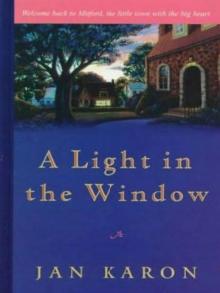 A Light in the Window
A Light in the Window Somewhere Safe With Somebody Good
Somewhere Safe With Somebody Good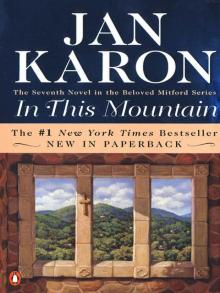 In This Mountain
In This Mountain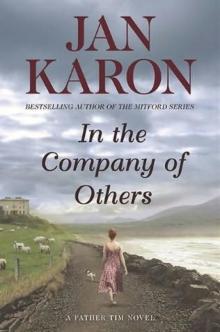 In the Company of Others
In the Company of Others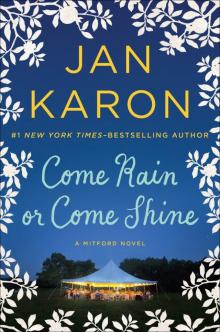 Come Rain or Come Shine
Come Rain or Come Shine To Be Where You Are
To Be Where You Are These High, Green Hills
These High, Green Hills Light From Heaven
Light From Heaven A New Song
A New Song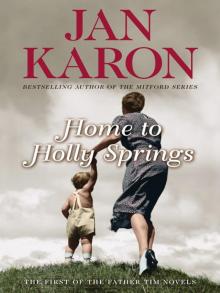 Home to Holly Springs
Home to Holly Springs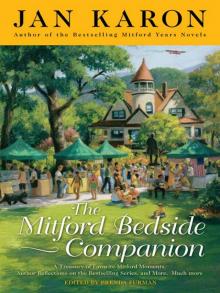 The Mitford Bedside Companion
The Mitford Bedside Companion At Home in Mitford
At Home in Mitford Shepherds Abiding
Shepherds Abiding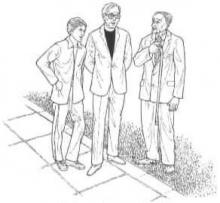 Out to Canaan
Out to Canaan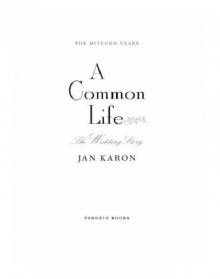 A Common Life: The Wedding Story
A Common Life: The Wedding Story Jan Karon's Mitford Years
Jan Karon's Mitford Years